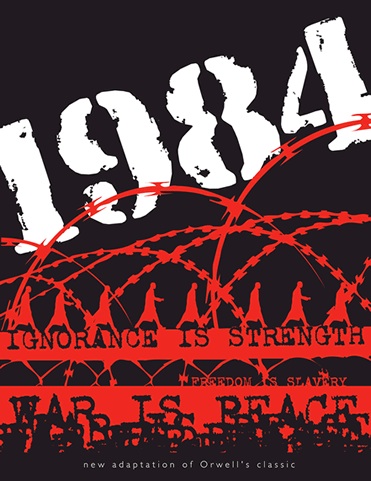

Blaring neon lights wash a simple set consisting of seamless white walls and a single chair in the middle. The entire audience recoils, eyes slowly adjusting, peering at a limp body strapped into the chair. The man releases a chilling scream and begs the audience to set him free, accusing us of being complacent in his torture. “1984” unapologetically shatters Broadway’s expectations and forces the audience into a realm of moral ambiguity. The show, which opened on Broadway June 22, is in its final week on the Broadway stage and closes Oct. 8.
George Orwell’s seminal novel has been gripping readers since its release, with sales skyrocketing after last year’s election. The novel tells the tale of Winston, a citizen of a dystopian world whose primary job is writing fabricated news stories to control public history and communal consciousness. His strictly forbidden romance with his coworker, Julia, helps direct his rebellion against the “thought police” as the novel progresses. Robert Icke and Duncan Macmillan adapted the novel for the stage, and it came to Broadway shortly after the 2016 presidential election.The show quickly made news, with multiple reports of audience members getting out of their seats, yelling at the actors, vomiting and crying.
The classic Broadway audience is used to being “challenged” in the least challenging ways. As an audience, we adore plays with moral messages, original art direction and heartwarming interpersonal relationships. “1984” is one of the first Broadway plays to depict graphic torture on stage, but that isn’t what makes it a must-see. The nuance in the message, the timing of its release and the astonishing effort from the actors gives the piece its value.
In this new era of “alternative facts” and fake news, “1984” almost seems like a heavy-handed commentary. This wildly fantastical and unrealistic world shares so many jarring qualities with our present day that seeing it all dramatized is more than shocking. Living in Trump’s America is desensitizing, and we all begin to forget just how unacceptable political deceit and manipulation of the news are.
The artistic direction of the show is striking: The set uses many television screens to show propaganda. At some points, they expand the set by projecting offstage characters and torture, which is made real through carefully timed light and sound cues. Also notable is the directors’ decision to add a time-jump element that the book cannot represent. The play switches time periods erratically and at one point puts a singular scene on loop, changing small elements every time the loop restarts. This helps further disorient the audience and personally sent me on a spiral into the purposefully illogical realm of “1984.” Sensory aspects of the play are what separate it from the novel — ambiguity is no longer a concept but a physical sensation.
“1984” is bold, completely immersive, but most importantly, it leaves us with a slew of unanswered questions. We, as an audience, are being asked to think deeply about questions of truth, morality and political control in a time where we need the answers more than ever.